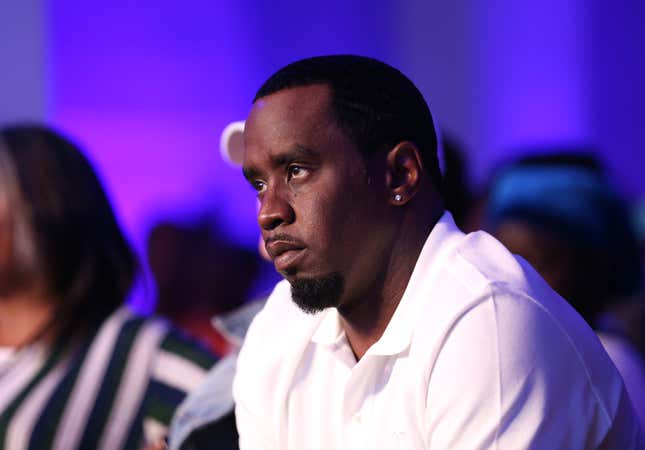
Hip hop mogul and entrepreneur Sean “Diddy” Combs released a statement Thursday in support of Entertainment Studios Network (ESN) founder Byron Allen, who is currently squaring off against the cable TV provider Comcast in a Supreme Court case that could seriously impact the future of racial discrimination lawsuits.
Allen, head of ESN, filed a $20 billion lawsuit against Comcast in February 2015, alleging that the telecom giant refused to carry his cable channels in part because they’re black-owned. Allen, in his original complaint, alleged Comcast executives gaslit him and made racist statements during their negotiations. As Variety reports, Comcast rebuffed Allen’s claims, saying their decision to not run his seven lifestyle cable channels was strictly business-based: there was simply not enough audience demand for the ESN channels.
Combs’ network, REVOLT TV, was also named by Comcast as evidence of the telecommunications conglomerate’s diverse and inclusive business practices. In this statement, Combs pushes back against that claim, saying the level of support REVOLT received from Comcast wasn’t enough to build a successful black network.
He also underscored the historic importance of the suit. At the heart of Allen’s case is a Reconstruction-era statute barring discrimination on the basis of race, color and ethnicity when making and enforcing contracts. Allen is arguing that Comcast violated that law in considering race at all—even if there were other factors involved in the decision. Comcast counters that the law applies to decisions in which race was the sole factor.
“In its efforts to get the lawsuit filed by Byron Allen dismissed, Comcast has taken a legal approach that could weaken fundamental civil rights protections,” Combs wrote in a statement shared with The Root. “I have a problem with this.”
“To be clear, anything that makes it harder to fight against discrimination is wrong,” he added. “Comcast is choosing to be on the wrong side of history.”
You can read the entire statement below:
My name and my network, REVOLT, have been mentioned recently by Comcast in reference to the Comcast/Byron Allen US Supreme Court case as an example of Comcast’s inclusive practices with respect to African American owned cable networks. While it is true that we are in business with Comcast, it is not accurate to use my name or my network as an example of inclusion. I do not want my name to be used inaccurately so I must speak my truth. I also want to make clear that this case is now about much more than cable distribution. It’s about the civil rights of millions of African Americans and other minorities.
First, it’s important that people really understand what’s at stake. In its efforts to get the lawsuit filed by Byron Allen dismissed, Comcast has taken a legal approach that could weaken fundamental civil rights protections. I have a problem with this. The Civil Rights Act of 1866 section 1981 was designed to ensure Black people are able to do business in this country and not be denied because of race. Comcast is arguing that this law only applies if racial discrimination is the only factor that leads to a refusal to do business, which would be extremely hard to prove. If they are successful, it will become much harder for any victim of discrimination to seek justice in court. By taking this stance in the Supreme Court, Comcast has put its legal tactics ahead of the rights of millions of Americans to be heard. This is not OK.
Above anything else, my goal has always been to achieve true economic inclusion for Black people. How can Comcast suggest that it champions diversity and inclusion if it attacks the laws that provide the foundation for economic inclusion? What good are any of their efforts if they are fighting to make it harder for victims of discrimination to be heard in court? Comcast has made this about much more than Byron Allen, and now the civil rights of my children and my community are at stake. To be clear, anything that makes it harder to fight against discrimination is wrong. Comcast is choosing to be on the wrong side of history.
On REVOLT, I can only share the truth of my experience. Starting an independent cable network is incredibly difficult and capital intensive. The start we received from Comcast, which was a condition of the United States government approval for Comcast to acquire NBCUniversal, was important, but it is not the level of support needed to build a successful African American owned network. Not even close. Since that launch our relationship has not grown, and REVOLT is still not carried by Comcast in the most affordable packages nor is REVOLT available in all of the markets that would enable us to serve our target audience. Comcast spends billions of dollars on content networks every year, but just a few million go to African American owned networks like REVOLT. That is unacceptable.
Supporting diversity and economic inclusion requires a real partnership. The only way Black owned networks grow and thrive is with meaningful and consistent economic support. Otherwise they are set up to fail. REVOLT has never been in a position to truly compete on a fair playing field because it has not received the economic and distribution support necessary for real economic inclusion. Our relationship with Comcast is the illusion of economic inclusion.
Rather than using this case to diminish the civil rights protections of millions of Americans, Comcast should use this as an opportunity to listen to a community it relies on and, above all, do better.

